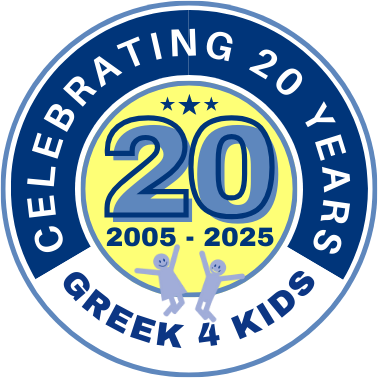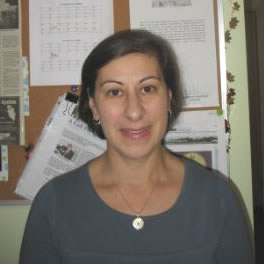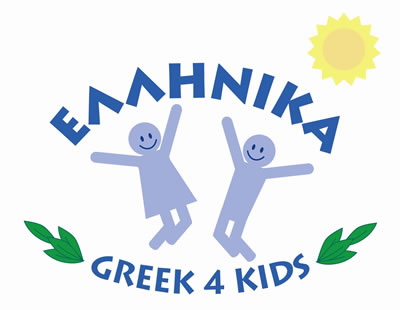ABOUT US

Αγαπητοί φίλοι και φίλες,
Thank You for your interest in the School and its programs.
Like everyone else in the Greek-American community, I have been witnessing the lack of Greek Language classes for very young children and the need for more after school Greek language and culture programs in the wider metropolitan Boston area. Keeping in mind that children learn the easiest and fastest within the first years of their lives, I wanted to use my educational and teaching expertise in second language acquisition and attempt to offer a quality Greek Education program in a school setting.
In 2005 Greek 4 Kids started as a Saturday school offering Greek Language instruction to children ages 10 months to 6 years in Melrose, Ma. As time went by, the need for more space, teachers and different level classes was becoming more and more obvious. A conveniently located school in Newton, Ma was perceived as a good solution to meet the increasing school enrollment for the 2007-2008 school year.
My goal is for the Greek 4 Kids classroom to be an inviting place, a friendly class setting, where learning takes place and there is the best use of parents’ and kids’ time. I would like to invite parents and children of Greek and non Greek ancestry to join in and learn a modern European language with a long history of influence on other languages, including English.
I would like to thank my family and friends for their encouragement for this undertaking. They have been my great source of inspiration and strength all these years. We all share the same passion for our Greek language, culture and faith and are concerned for its future in this country.
Please feel free to contact me with your questions, suggestions, and valuable feedback. I hope you and your children enjoy the classes. I look forward to meeting you!
Με εκτίμηση,
Kleanthi Mavrogiannaki, MA
Founder, Director & Teacher
Greek 4 Kids
Our Curriculum
Greek 4 Kids is committed to working with families to help each child reach his/her potential. It offers a structured, yet fun teaching approach for young children, ranging from toddlers to 12 years, to learn Modern Greek in a stimulating classroom setting. Instruction of Traditional Greek Folk Dances aims to supplement language instruction.
The Program also offers a unique opportunity to kids who do not practice Greek at home to start learning a new language from an early age and to kids who speak Greek at home to get the opportunity to use it in a social and “classroom” like context.
A variety of activities aim to tickle different senses (hearing, touch, vision) and expose children to Greek children’s folk culture in the form of games, songs, prayers, rhymes, music, hands-on activities. Children practice listening and talking while socializing. The class is conducted primarily in Greek to help them enhance their comprehension. Kids learn naturally, not by translating. First they hear, then they understand, and finally they speak. Comprehension always exceeds fluency and speaking will eventually be spontaneous. The classroom themes and materials have been carefully chosen to intrigue the children’s mind and encourage progress at their own pace.
The Greek 4 Kids curriculum emphasizes fun and play. Limits are made clear and defined. Lesson plans are adapted to each age group and the developmental capacity of each child. Material used in class is authentic. A nurturing environment enhances children’s self-esteem and curiosity, promotes independence, creativity, desire to explore the world through imagination, while encouraging them to develop a strong sense of pride and achievement.
Learning is to take place in a natural, un-pressured way by singing, inventing a wide range of games, hopping to an object, watching puppets do exaggerated gestures, drawing, scribbling, use of magnet boards, and so much more. Every child can learn Greek when having fun. It is no different than learning how to speak English, just a little extra stimulation is needed.
Learning two languages is also learning two cultures. It means learning how to ACT in two different cultures. Through arts, drama and music, children become culturally diverse by ACTING Greek, imitating hand gestures, vocal intonations and facial expressions.
Founder, Director & Teacher of Greek 4 Kids

Kleanthi E. Mavrogiannaki, M.A.
Native speaker of Greek with an educational background, administrative and teaching expertise that enable her to offer a quality educational program for children and adults of Greek and non-Greek ancestry.
Our Mission & Philosophy
OUR MISSION:
Inspiring students to excel.
To help families of Greek and non Greek ancestry and backgrounds raise bilingual children, starting at an early age, by offering a challenging, high quality, and developmentally appropriate curriculum.
To provide a learning environment enriched by the teaching of the Greek Language, History, Culture, Faith where each student develops his or her own talents and potential to the fullest.
To reinforce cultural awareness and to instill a sense of pride in younger generations by promoting Greek language and culture. To encourage the preservation of the Greek ethnic heritage in the diverse and multicultural American society.
To create a school community of people who value Greek Paideia and create a partnership with the School so the above mission statements are met.
TEACHING PHILOSOPHY & METHODOLOGY:
Greek through language arts, creative arts, music and play.
Children are naturals at language learning: their lack of inhibition and adaptability makes it easier for them to pick up sounds and words. During the earliest years of a child’s life the most significant brain development takes place. The plasticity of a child’s brain is at its maximum. The interest of children to know the world is also the motive for learning. When children feel safe in a stimulating environment, they want to explore it with their senses, develop ideas and structure knowledge.
As a parent, you are offering your child a life-long advantage by exposing him/her to a foreign language at an early age. Besides providing a head start for their future language learning and building their self-confidence, they benefit from a proven boost to scholastic performance in other subject areas by developing their learning skills.
Language is to be taught hand in hand with culture. Our curriculum draws from the Modern Greek culture, rich Hellenic and Greek Orthodox heritage and traditions to compliment the home by promoting optimal cognitive, physical, social, and emotional development.
Greek 4 Kids operates on the philosophy that young children learn best through direct sensory experiences that encourage self-expression. The School provides experiences to meet children’s needs and stimulate learning in all developmental areas – physical, social, emotional, and intellectual. Its philosophy draws upon the best practices of the child-development tradition in early childhood education. Play is a major component of the program, combined with activities such as: storytelling, reading stories, arts and crafts, music and creative movement, singing, puppetry, games.
Greek 4 Kids takes into consideration the individuality of each child, interests and needs. The School places special emphasis on social and language development in two languages and sets asobjectives the intellectual and emotional development of children with classroom experiences that will help them realize their full potential in learning another language.
Emphasis is given on communication – that is, students are encouraged to express themselves in Greek. Grammar is a tool, but not a goal.
Research shows that children have the mental flexibility to acquire a new language with a native or near-native accent, provided that they have native teachers as models. Greek 4 Kids’ teachers are native speakers of Greek. Therefore, students are always in contact with authentic Greek and excellent pronunciation, presented in a participatory environment.
The School uses authentic teaching materials developed for the teaching of Greek as a second or foreign language. Older children use age and level appropriate textbooks and worksheets targeting their interests and abilities.
Since young children have a rather short attention span and learn best when they are actively involved in physical activities the curriculum is structured to provide ample opportunities for movement and oral practice. They are always encouraged to participate in simple conversations, both teacher-to-child and child-to-child.
For children to become engaged, classes must be fun and fast moving. Children need to be constantly stimulated and alert. Activities are selected to appeal to different learning styles: listening to stories, coloring pictures, manipulating objects, mimicking and acting out songs, playing language games, identifying flash cards, and (for older children) learning to read and write. Teachers use communicative games and primary school techniques for a practical and fun use of Greek.
Criteria for class placement are age and competencies in all fields of communication.
Our Sponsors:










Why Learn Greek?
Research has found that a child’s experiences during the first years of life have a profound impact on social, emotional, language and intellectual growth. At a young age children also possess their greatest capacity to absorb and retain language.
Family and Community need to be involved and work together into the difficult task of providing children with a bilingual education. Greek 4 Kids believes that it can contribute in its own way into this team effort, in which the school, home, and community are closely allied to educate children. The benefits and rewards of learning Greek go beyond reasons of simply preserving a cultural group’s language and heritage in America.
Knowing Greek is an essential part of a whole education and can lead to:
- A positive self image.
- Kids take pride when “It is not all Greek to them!”
- Better academic performance in the everyday school, considering the benefits of bilingualism and influence of the Greek language on English.
Why, how and when should my child learn a second language?
(By Kathleen Marcos of the ERIC Clearinghouse on Languages and Linguistics)
Much media attention has recently been focused on the importance of early learning experiences on brain development. Newsweek devoted a special edition to the critical first 3 years of a child’s life and indicated that there is a “window of opportunity” for second language learning starting at 1 year of age.
A February 1997 article in Time magazine suggested that foreign languages should be taught to children as early as possible. With so many demands already placed on children, parents might ask: Is it important that my child learns a second language at a young age? Why? What options are available?
What are the benefits of knowing a second language?
In addition to developing a lifelong ability to communicate with more people, children may derive other benefits from early language instruction, including improved overall school performance and superior problem-solving skills. Knowing a second language ultimately provides a competitive advantage in the workforce by opening up additional job opportunities.
Students of foreign languages score statistically higher on standardized tests conducted in English. In its 1992 report, College Bound Seniors: The 1992 Profile of SAT and Achievement Test Takers, the College Entrance Examination Board reported that students who averaged 4 or more years of foreign language study scored higher on the verbal section of the Scholastic Aptitude Test (SAT) than those who had studied 4 or more years in any other subject area. In addition, the average mathematics score for individuals who had taken 4 or more years of foreign language study was identical to the average score of those who had studied 4 years of mathematics. These findings are consistent with College Board profiles for previous years.
Students of foreign languages have access to a greater number of career possibilities and develop a deeper understanding of their own and other cultures. Some evidence also suggests that children who receive second language instruction are more creative and better at solving complexproblems. The benefits to society are many. Americans fluent in other languages enhance our economic competitiveness abroad, improve global communication, and maintain our political and security interests.
Why is it better for my child to learn a language in elementary school?
Studies have shown — and experience has supported, that children who learn a language before the onset of adolescence are much more likely to have native-like pronunciation. A number of experts attribute this proficiency to physiological changes that occur in the maturing brain as a child enters puberty. Of course, as with any subject, the more years a child can devote to learning a language, the more competent he or she will become. In any case, introducing children to alternative ways of expressing themselves and to different cultures generally broadens their outlook and gives them the opportunity to communicate with many more people.
Will a second language interfere with my child’s English ability?
In most cases, learning another language enhances a child’s English ability. Children can learn much about English by learning the structure of other languages. Common vocabulary also helps children learn the meaning of new words in English. Experimental studies have shown that no long-term delay in native English language development occurs in children participating in second language classes, even in full immersion programs. In fact, children enrolled in foreign language programs score statistically higher on standardized tests conducted in English.
A number of reports have demonstrated that children who have learned a second language earn higher SAT scores, particularly on the verbal section of the test. One study showed that by the fifth year of an immersion program, students outperformed all comparison groups and remained high academic achievers throughout their schooling.
